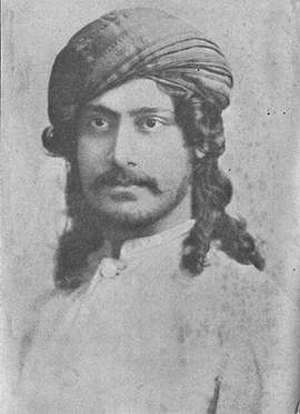Apr 21, 2025
Apr 21, 2025
Excerpts from Tagore’s Letters & Diaries.
From ‘Europe Tourist’s Diary’ – 6 Oct. 1890
 My tenure abroad is not yet over, but I am indeed impatient for this already. I am ashamed to confess – I am no more liking to linger on here. This is not a matter of pride, but it is a shortcoming in my nature.
My tenure abroad is not yet over, but I am indeed impatient for this already. I am ashamed to confess – I am no more liking to linger on here. This is not a matter of pride, but it is a shortcoming in my nature.
When I look for its excuses, it seems, the image of Europe which glares our mind has evolved from reading her history and literature which is the ideal Europe. It is not obvious unless you have probed into their heart. On our stint here for 3 or 6 months or even 6 years we merely observe the external motions of the European civilization, with its mansions, big factories, various entertainment spots where people are moving around amidst great grandeur. It may be multifarious and even amazing, yet it brings the observer an exhaustion. The excitement of wonder does nor fulfil the heart but fritters the mind.
At last, I cannot help the thought – Well Man! Yours are the big cities, a vast country with unlimited treasures.. But no more evidences are required for that as enough is enough; now, only a return home will rescue me. There (at home) I know and understand all to savour humanity at once breaking through their outer shell. There I can enjoy, think and love easily. If I had a free passage to where the real man is, then even in a foreign country I would have seen my own men and the place would not appear to be alien. But here I see only the British, the foreigners. Whatever novel in their manners and new, strikes my eye, but the eternal remains veiled. That’s why we have mere acquaintance with them, but no camaraderie.
Here comes to my mind a fable. One clever jackal invited a wise crane for a feast. The crane saw at the invitation spot large dishes full of delicious sauces. After initial pleasantries, the jackal requested the crane to start the feast and at once started licking the dish. The crane with his long beak failed to lift anything to his mouth even repeatedly hitting the dish. At last he gave up and with his natural solemnity he sat in meditation by the side of the pond. The jackal once interrupted with his scoff, “Brother, why you are not eating? You have been given unnecessary trouble. My arrangements have not been up to your standard.”. Maybe the crane replied with modesty, “Ah no; your menu has been excellent, But due to my indisposition I have no appetite to-day.” Next day, on the crane’s invitation the jackal went to his place to find again arrangement of delicious foods but inside a long jar. It was tempting, but the jackal could not thrust his mouth inside the jar. The crane at once dipped his beak into it and engaged in eating. The jackal licked the outside of the pot and some waste straying here and there.
In our national feast the foreigners are similarly placed. The food is equally delicious for both, but the containers are different. If the British are the jackal, the pudding on their wide stretched bright silver dish are merely for our eye and we must return hungry. And if we are the meditative crane, the jackal cannot even see well what is there in our deep container. From far they have merely to smell its fragrance and go back.
Every nation’s past history and external manners are to their convenience, but is hindrance for other nations. So, though the English are apparently overt, but at our eye’s corner we merely glimpse an infinitesimal fraction of them, but it does not meet our appetite. International feast is possible only in case of literature. There neither the long beaked nor the long-tongued are deprived.
Be the logic obvious or not, I am tired of how-do-you-doing with the people here and also of my amazement while wandering the roads, visiting the theatres, shops, factories and even looking at the beautiful faces.
So I have determined to return home.
Originally published in the Bulletin (May 2010) of the Ramakrishna Mission Institute of Culture.
Translation by the author.
References and Source
The January-June 2003 issue of “Shrayan” a compilation from Tagore’s letters and diaries. by the editor of the magazine Mr. Pathik Basu.